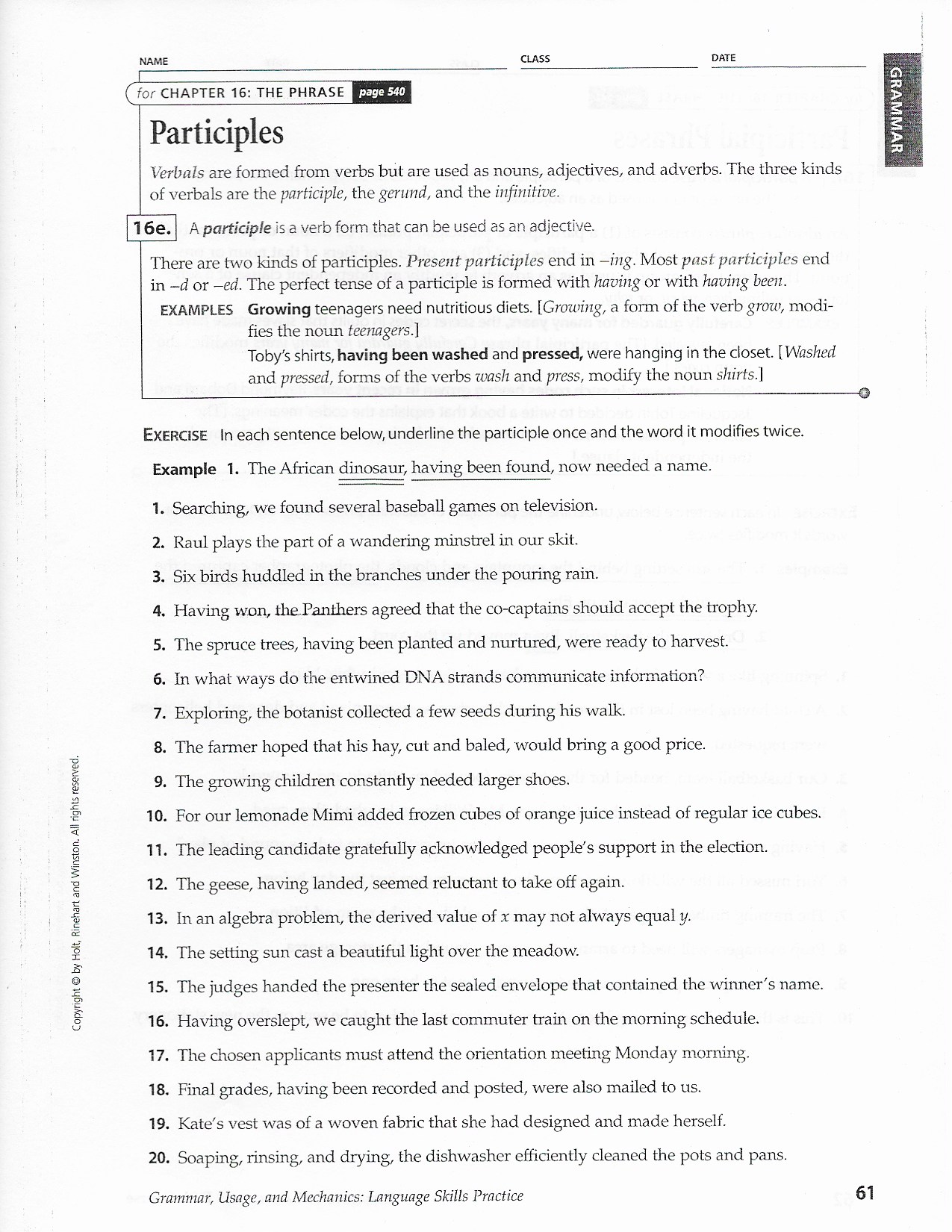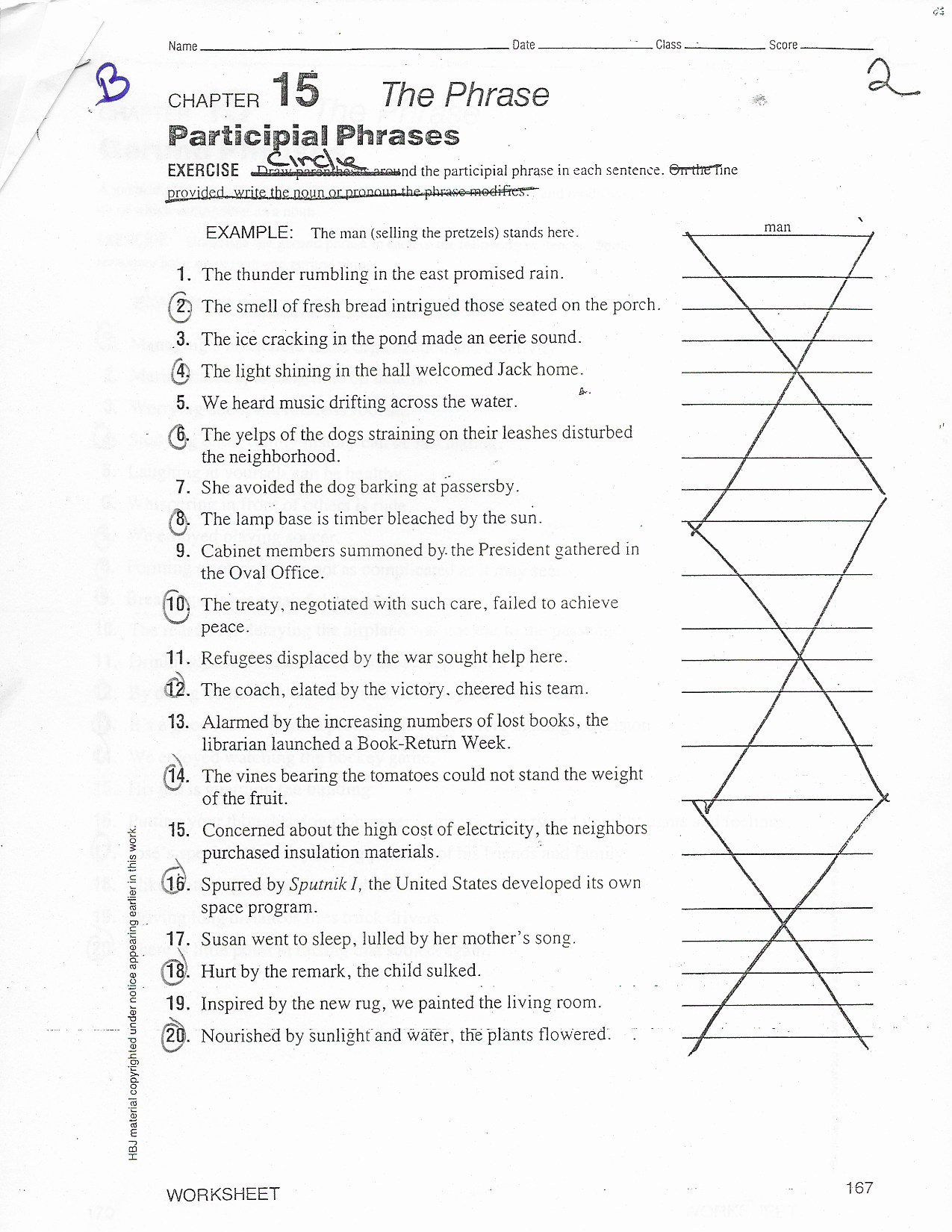VERBALS
Participles *** Gerunds *** Infinitives
Verbal: A verbal is a verb form that no longer acts like a verb. In other words, a verbal looks like a verb but it has turned itself into a noun or an adjective.
- Verbals can be one worded or they can be part of a phrase.
- There are three types of verbals:
-
- Participle (Phrase) VERB + ING, ED, ED, OR T ADJECTIVE
- Gerund (Phrase) VERB + ING NOUN
- Infinitive (Phrase) TO + VERB NOUN, ADJECTIVE, OR ADVERB
-
- ***Verbals are NO LONGER VERBS in a sentence. It is IMPORTANT that you identify the verb or verb phrase in a sentence so you do not consider it to be a verbal.***
The Participle (Phrase)
A Participle is a verb form that has turned itself into an adjective. It can do anything that an adjective can do. It will describe nouns. The participle will usually touch the noun it is describing (usually it is placed in front of the noun, but it can be placed behind the noun as well).
- Participles are verb forms that must end in one these endings:
-
- ed, ing, en, or sometimes t (made can be a participal; notice it does not have an ending)
verb + ending = participle (99% of the time)
- You can remove a participle from the sentence. Participles—like adjectives—are not necessary in a sentence. YOU CAN NOT REMOVE A PARTICIPAL from a sentence and not harm the sentence. You can not do that with a verb as verbs are always needed.
EXAMPLES:
1. The rotting apple smelled really awful.
Rotting is the participle. (Rot + ing = rotting). Rotting acts as an adjective because it describes the apple.
2. His running car sounds as if it is dying!
Running is the participle. (run + ing = running). Running acts as an adjective in that it describes the car. DYING is a verb in the above sentence.
***A sentence can have more than one participle, but that is rare.***
The Participial Phrase
A participial phrase begins with a participle (verb + ING, ED, EN, or T). To the participle will be attached prepositional phrases, adjectives, adverbs, etc. The WHOLE PARTICIPIAL PHRASE acts as one giant adjective in the sentence.
- Participial phrases are not needed in a sentence. They are added by the writer as extra bling to make the sentence pop in the readers mind. Since they are not needed, participial phrases require that a COMMA or COMMAS be used to set them apart from the main sentence.
- *** It is not necessary to add a comma if the participial phrase ends the sentence.
Where to place the commas when using participial phrases:
- Participial Phrase, SENTENCE
- Sentence starts, Participial Phrase, the rest of the sentence.
- Sentence Participial Phrase
EXAMPLES:
***Eating like a wild animal, Mitchell ate everything set before him.
******My best friend, howling at the moon, pretended that he was a werewolf.
*******Julian ate the pizza swimming with lots of grease from the pepperoni.
FIND THE PARTCIPLE (PHRASE)
- The screaming baby kept us awake last night.
- Kneading the big ball of dough, the baker whistled as if he was having fun.
- My best friend, begging for another chance to win the price, really needed the money.
- After the party the participants made there way to Ally’s house hooting and howling.
HOMEWORK

